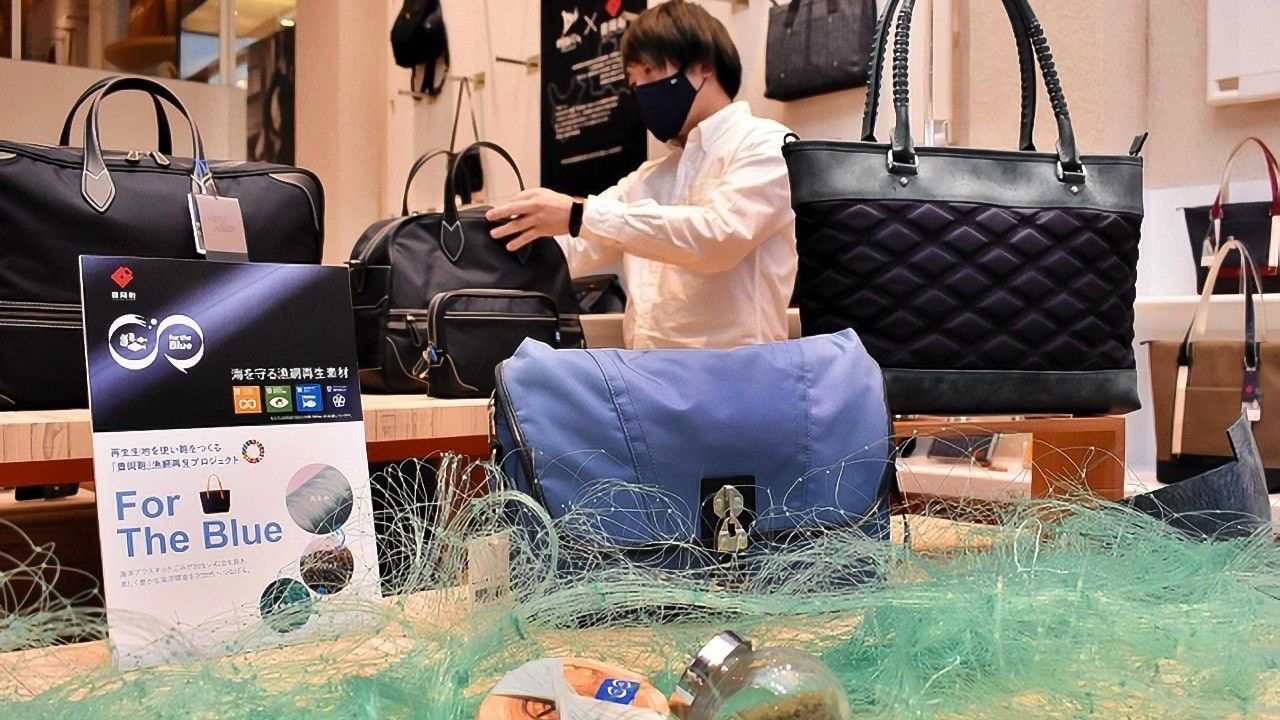
An Eco-Friendly Catch: New Bags from Used Fishing Nets
Society Environment- English
- 日本語
- 简体字
- 繁體字
- Français
- Español
- العربية
- Русский
[Kobe Shimbun] “Suitcase Alley,” in the commercial district of the city of Toyooka, Hyōgo Prefecture, is home to many shops selling bags. Here Hashimoto Takahiro—manager of Artisan Avenue, an outlet for the manufacturers operating under the Toyooka Kaban brand—proclaims proudly, “This bag is made of discarded fishing nets!”
The store’s shelves are stacked with shoulder bags and tote bags, with prices ranging from around ¥23,000 up to almost ¥80,000. A light-blue fishing net, advertising the raw material making up these products, sits before them in the shop.
Facing competition from cheap goods from China and other imported products, the 11 members of the Toyooka Kaban consortium are counting on the power of their entirely domestically produced wares. The Hyōgo Prefecture Bag Industry Association was founded in 2006, and only products that go through its rigorous certification process can use the Toyooka Kaban brand name.
A study on how to achieve the UN Sustainable Development Goals kicked off two years ago. On learning of the production of materials using recycled fishing nets through the Tokyo-based Alliance for the Blue, set up by the Nippon Foundation to reduce ocean waste and recycle marine resources, the group decided to take part. As a large base for fisheries, known in particular for its catches of snow crabs, Toyooka supported this initiative.
For the materials, a Hokkaidō fishing net merchant starts by collecting nets that have been used for salmon catches; these are then recycled into resin pellets by a Tokyo materials recycling firm. These are then spun into thread and woven into fabrics by an Osaka textile company. This is a cooperative project on a national scale.
At present the 11 companies that manufacture under the Toyooka Kaban brand produce a wide variety of models ranging from tote bags to Boston bags. The Toyooka Kaban Artisan Avenue store sells about 70 pieces a month, and there are even waiting lists for certain models.
Morito the Osaka-based company that developed the fabrics, is also searching for ways to turn fishing nets that have been used locally into materials, working together with Hyōgo’s Tajima Fisheries Cooperative, which fishes for crab. The nets used for crab fishing are very tough, meaning high recycling costs and considerable difficulty turning them into products, but the company has picked up some fishing nets that are easier to recycle and is planning to produce small articles that can be used by fishers on-site.
One of the Toyooka manufacturers, Naoto, is currently working on producing a school bag. Miyashita Eiji, the company’s president, is expecting great things from greater exposure to the younger generation on the premise that “it would be good if items they use on a daily basis help them learn about environmental awareness.”
The Toyooka Kaban recycled-net bags can also be bought online through the Toyooka Kaban Artisan Avenue web store.
Leftover Cuttings for Smaller Articles
The Toyooka Kaban manufacturers have gone beyond just bags to develop smaller purse and accessory product lines. The accessories make use of leftover leather and cloth cuttings from bag production, and include products ranging from pouches to key cases and coin purses.
Production of purses started in 2018 during a technical training seminar for the craftspeople. The accessories were launched in the following year, after small pouches were brought by a partner company to a certification meeting of the Hyōgo Prefecture Bag Industry Association.
Leather-cutting waste is always generated in the bag manufacturing process. Using these cuttings for the Toyooka goods not only reduces waste output, it also generates one-of-a-kind products that make popular gifts.
Some of the manufacturers are also looking into making products that have been tanned using pomace, the solid material left over from the winemaking process. Their aim is to reduce environmental impact by avoiding the use of chemical agents.
(Translated from Japanese. Banner photo: Bags that are made using recycled fishing nets. The fishing nets are also on display at Toyooka Kaban’s Artisan Avenue. Article and photo by Ishikawa Midori.)
[© The Kobe Shimbun]